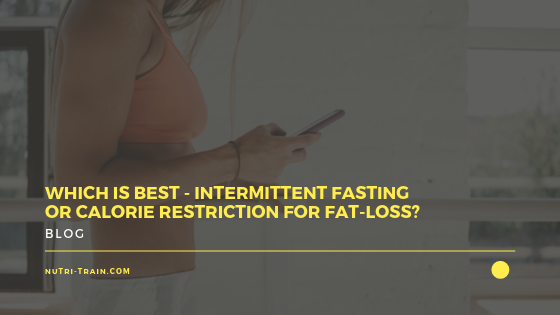Which is best - intermittent fasting or calorie restriction for fat-loss and subsequent health?14/10/2019
It’s important to point out that first and foremost, health should be EVERYONE’S goal, and since a higher fat-percentage (not weight) is associated with ill-health[1], then a fat-loss goal is definitely something most of us can benefit from.
It’s also vital to make clear that ALL diets and eating patterns work in the short-term, when followed correctly obviously, but since our average lifespan is around 80 years in the UK, short-term just won’t cut it.
When comparing both intermittent fasting and calorie restriction, there are a few limitations;
And so, going forward I’d like to make clear that when I’m referring to Intermittent Fasting (IF), I’m referring to any method which has an individual abstaining from all foods for longer than 12 hours, whilst Calorie Restriction (CR) will refer to any method which has an indivdual eating less calories daily and not actively skipping a meal. Now, I’d like to first point out that calorie/energy restriction is a natural by-product of fasting intermittently, and is therefore often (by some) only labelled as effective because of this. Which is partly true, as some of the benefits most people experience is associated with the weight that’s lost, but there are other benefits associated with fasting too, most of which I’ll address here.
Full disclosure before moving forward – I do not count my calories, I haven’t in over 7 years and I don’t use it in my healthy lifestyle coaching. I can see the benefits of counting calories if that’s your thing, and for all who are seeing results with it should definitely carry on, however for the rest of you, and according to a 2015 study[2] that’s around of 99%, then fasting could be the answer you’ve been looking for.
The study above, compared data from 2004-2014 to ‘examined the probability of an obese person attaining normal body weight’, and found that only 1 in 210 obese men and 1 in 124 obese women succeed with conventional advice – that which is dominated by calorie counting. Bu, why? Well, there are multiple levels to this, some of which I’ve already address throughout my blogs – Sleep, Eat, Move and Repeat, but the general overview is the simple fact that we’ve been fed the wrong information – information such as not to skip a meal and that eating small meals/snacks every 2-3 hours will keep our metabolism healthy. Starvation Many describe and label IF as ‘starvation’, but in fact CR more closely resembles starvation due to its long-term effects on your basal metabolic rate (BMR) – the number of calories you burn to stay alive. The famous 1950 Minnesota Starvation study[3] clearly showed the negative impact a 30% caloric reduction had on the participants BMR, something we’ve also seen with so many of The Biggest Losers contestants’ post-contents. A 2016 study[4] which re-visited some contestants 6-years later, found that not only did they burn less calories daily due to a slower BMR, but they did so even though they’d re-gained the weight - meaning they were not only heavier, but naturally using less energy. IF on the other hand has shown positive result with BMR. A study in 2000[5] tested participants BMR after four days of continuous fasting and found that it actually increased by 12% - meaning your body is thriving more without food. These types of results with IF are usually described as a survival mechanism, which probably kept us alive and able to hunt for food during times of famine. Safety “But fasting is dangerous!” This one I find the most cynical if I’m honest, not only because we’ve been conditioned to think that we need to constantly be eating, but because most who are fasting are only doing so for around 12-24 hours. Did you know that Doctors require their patients to fast for 8–12 hours before drawing blood to get a true measure of their metabolic health? Just something to think about, especially when it comes to safety. But, for those who maybe believe that daily IF is still dangerous since we’re very rarely having our bloods done, a 2016 study[6] concluded was that IF ‘was a safe and effective therapy that anybody could reasonably follow’. Plus, with so many adopting IF as a health strategy, the evidence of its safety is only growing. In fact, if you really wanted to talk about safety, the same 2016 study above actually shows that IF decreased visceral fat (the dangerous fat which builds around our vital organs) nearly twice as effective as CR, and therefore improving their health markers. So, do you really think it’s that dangerous? Effective As I’ve already mentioned, both IF and CR are effective in the short-term, but it’s the long-term where our focus should be, and with the constant failings of intake/energy restriction through calorie counting, it’s time to stop blaming people for not being able to lose weight and give them another option.
I’ve written about the extensive problems with calorie counting, but many seem to unaware of all the benefits of fasting – even after just 12 hours of fasting daily or every other day!
Fasting intermittently can:
Lastly, intermittent fasting is free – something so many people seem to struggle with as they have to turn to more processed and unhealthier foods since they can’t afford healthier options all of the time. Conclusion In my option and according to some research, IF is better than CR for both fat-loss and your health. If you’d like more help and information with your fasting, please check my other blogs or The Fasting Playbook. I’d love to know what you think, please leave a comment below. Speak soon, JC [1] https://www.ncbi.nlm.nih.gov/pmc/articles/PMC3854278/ [2] https://www.ncbi.nlm.nih.gov/pmc/articles/PMC4539812/#!po=2.50000 [3] https://www.ncbi.nlm.nih.gov/pubmed/15930436 [4] https://onlinelibrary.wiley.com/doi/full/10.1002/oby.21538 [5] https://www.ncbi.nlm.nih.gov/pubmed/10837292 [6] https://www.ncbi.nlm.nih.gov/pubmed/27569118
0 Comments
Leave a Reply. |
AuthorsJC and The Nutri-Team Archives
November 2020
Categories
All
|

 RSS Feed
RSS Feed
